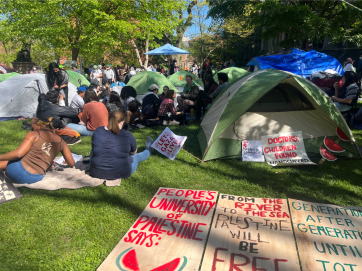Does progressivism in academia come as an imposition from higher-ups outside or above universities, or does it begin at a more grassroots level with individuals and their private causes? The last issue of the 2013 volume of NAS's quarterly journal considers the sources of progressive ideology on campus.
NAS members have received printed copies of this issue in the mail. (NAS members, click here for instructions on how to get full online access to all AQ articles.)
The featured articles from the winter 2013 AQ are listed below.*
This issue also includes poetry by Laura Stuckey and reviews of Jeffrey J. Selingo's College (Un)bound by Andrew Gillen and of Helen Smith's Men on Strike by Glenn M. Ricketts, as well as "Books, Articles, and Items of Academic Interest" by Robert Jackson. Two of this issue’s articles (Adèle Auxier Keim’s “The HHS Mandate and Religious Freedom: A Primer” and Chuck Stetson’s “Restoring a More Productive College Curriculum”) are available for free through www.nas.org.
Fisher v. Texas: Strictly Disappointing
Russell K. Nieli, Princeton University
In the first piece in this issue’s special section, “Campus Progressivism: Top-Down and Bottom-Up,” Russell K. Nieli places the recently decided Fisher v. University of Texas at Austin within a useful and unvarnished summary of Supreme Court race-related decisions.
After Fisher: Academic Review and Judicial Scrutiny
George R. La Noue, University of Maryland Baltimore County
While George R. La Noue is also disappointed in the Fisher v. Texas outcome, he believes the Court’s ruling makes it harder to hide race-based measures used in college admissions. Exposure could reveal that these practices violate the strict scrutiny standard still demanded by the law. La Noue offers practical, bottom-up ways for academics and others concerned to use Fisher’s ruling to challenge affirmative action on campus.
The Common Core: Far from Home
Michael Toscano, National Association of Scholars
In our third “Campus Progressivism: Top-Down and Bottom-Up” entry, Michael Toscano recounts how the swiftly ubiquitous Common Core State Standards were conceived, presented, and implemented—by “a unique interlocking of powerful private, federal, and philanthropic interests”—usurping control of education from parents and local communities.
The HHS Mandate and Religious Freedom: A Primer
Adèle Auxier Keim, The Becket Fund for Religious Liberty
Many regard the Health and Human Services contraceptive mandate, the requirement that contraception and abortifacient drugs be provided free on all insurance plans under the Patient Protection and Affordable Care Act, to be a violation of freedom of religion. This has precipitated numerous lawsuits, including from religiously based higher education institutions. Adèle Auxier Keim outlines the arguments, which involve law school professors on both sides of the debate, and reports on how the court cases are proceeding.
Restoring a More Productive College Curriculum
Chuck Stetson, PEI Funds
As founder and managing director of PEI Funds, a venture capital firm based in New York City, and founder and CEO of Essentials in Education, Chuck Stetson has interviewed far too many recent job candidates who are severely deficient in basic knowledge of how business functions. In our final “Campus Progressivism: Top-Down and Bottom-Up” entry, Stetson discusses his suggestions for returning humanist values to higher education and business education specifically, which have resulted in a new online course and textbook, “Flourishing Through Business 101.”
Purging Petraeus: The Progressive Assault on Academic Freedom
An Academic Questions rubric, “For the Record,” returns with this collection of documents surrounding the harassment of General David Petraeus by some students and faculty when he assumed a teaching position at the City University of New York this past September. These documents include the CUNY administration’s response in defense of academic freedom, which shows that pushing back against student belligerency can work.
A Musing on Schuller’s Musings
Daniel Asia, University of Arizona
Daniel Asia reflects on Musings: The Musical Worlds of Gunther Schuller: A Collection of His Writings, first published in 1986, discussing how the celebrated composer, conductor, writer, and educator came to admit that the modernist experiments he once championed have not been embraced by musical audiences.
On Teaching Ethnographic Film
Geoffrey Clarfield
Canadian anthropologist Geoffrey Clarfield illustrates how the use of ethnographic films—if the instructor places them in their proper historical and cultural context—can enhance the study of anthropology and override simplistic ideas about the scope and efficacy of Western intervention in the Third World.
Ignoble Savages
Glynn Custred, California State University, East Bay
In his review essay of Napoleon Chagnon’s Noble Savages: My Life Among Two Dangerous Tribes—the Yanomamö and the Anthropologists, anthropology professor Glynn Custred recounts Chagnon’s over thirty years of field work in the Amazon as well as the ongoing attacks coming from within Chagnon’s anthropological community at home.
Real Sweetness, Real Light
Edward Alexander, emeritus, University of Washington, Seattle
In his review essay of James Seaton’s forthcoming Literary Criticism from Plato to Postmodernism: The Humanistic Alternative, Edward Alexander discusses the book as a defense of literary criticism and of literature itself as he celebrates Seaton’s accomplishments.
*Article descriptions from “The Issue at a Glance,” Academic Questions (2013) 26:379-381.













